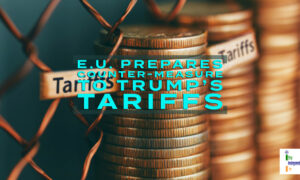
The latest legislation will greatly enhance the existing E.U. framework by taking into account new and emerging challenges linked to technological innovation
The European Commission today, i.e., Tuesday, July 20, 2021, unveiled an ambitious package of legislative proposals to strengthen the European Union’s (E.U.’s) Anti-Money Laundering and Countering Terrorism Financing (AML/CFT) rules.
The legislations aim to improve the detection of suspicious transactions and activities and to close the loopholes that criminals use. The proposal also includes provision for creating a new E.U. authority to fight money laundering.
The latest legislation will greatly enhance the existing E.U. framework by taking into account new and emerging challenges linked to technological innovation. These include virtual currencies, more integrated financial flows in the Single Market and the global nature of terrorist organisations.
Taking it to twitter, the President of European Commission tweeted,
We step up our fight against financial crime with a new EU Anti-Money Laundering Authority.
— Ursula von der Leyen (@vonderleyen) July 20, 2021
It will monitor and coordinate national action against money laundering and terrorist financing.
It will also enhance cooperation among Financial Intelligence Units. https://t.co/wwe44waSbJ
She further tweeted,
We also propose:
— Ursula von der Leyen (@vonderleyen) July 20, 2021
• A Single EU Rulebook for AML to harmonise implementation, close loopholes and ease cross-border investigations
• Extending AML rules to the crypto sector
• A new approach to listing third countries posing a threat to the EU financial system
The new E.U. Anti-Money Laundering Authority (AMLA) will transform AML/CFT supervision in the E.U. and enhance cooperation among Financial Intelligence Units (FIUs). AMLA will be the central authority coordinating with national authorities to ensure the private sector correctly and consistently applies EU rules. AMLA will also support FIUs to improve their analytical capacity around illicit flows and make financial intelligence a key source for law enforcement agencies.
The European Commission tweeted,
Financial crime is a serious threat.
— European Commission
We present new proposals to strengthen the EU’s anti-money laundering and countering terrorism financing rules.
Our package ramps up our efforts to stop dirty money being washed through the financial system.(@EU_Commission) July 20, 2021
The European Commission further tweeted,
With our proposals on anti-money laundering, we are going to:
— European Commissionimprove detection of suspicious financial activities
close loopholes used by criminals to launder illicit proceeds or finance terrorist activities through the financial system
https://t.co/rhSo3IAolD pic.twitter.com/rVlRqkwC3x
(@EU_Commission) July 20, 2021
Talking about the scope of new legislation, the European Commission tweeted,
Our measures on anti-money laundering take into account technological challenges, such as:
— European CommissionVirtual currencies
More integrated financial flows in single market
Global nature of terrorist organisations
Read more in our Q&A: https://t.co/2fXVDNQtOh
Follow: @EU_Finance pic.twitter.com/C0CCOwuxuq(@EU_Commission) July 20, 2021
The Single EU Rulebook for AML/CFT will make sure that all the existing national registers of bank accounts are connected and provide faster access for FIUs to information on bank accounts. The Commission will also provide law enforcement authorities with access to this system, speeding up financial investigations and the recovery of criminal assets in cross-border cases.
Presently, only certain categories of crypto-asset service providers are included in the scope of E.U. AML/CFT rules. The new rules will extend these rules to the entire crypto sector, making it compulsory for all service providers to conduct due diligence on their customers. This will ensure full traceability of crypto-asset transfers, such as Bitcoin, and will allow for prevention and detection of their possible use for money laundering or terrorism financing. In addition, anonymous crypto asset wallets will be prohibited.
The European Commission has also proposed an E.U.-wide limit of €10,000 on large cash payments. Limiting large cash payments makes it harder for criminals to launder dirty money.
The legislative package will now be discussed by the European Parliament and Council. The Commission looks forward to a speedy legislative process. If approved, it will become operational in 2024 and will start its work of direct supervision slightly later.







